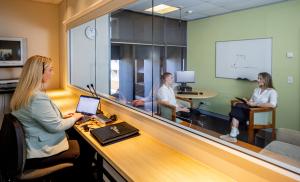The Faculty of Society and Design offers a platform for internationally recognised research into an eclectic portfolio of disciplines that relate directly to who we are and how we live as a society.
We welcome both traditional and non-traditional research proposals that are aligned with our core specialist fields – humanities, social sciences and the built environment. The diversity of our interests also means that our projects often encompass a multi-disciplinary approach, co-designed and executed with teams from other disciplines, other faculties, other universities and with various industry partners to generate outcomes that make a tangible impact on life and workplace issues.
Current research strengths include:
- Understanding the impact of music on the mind and social cognitions
- The application of cognitive neuropsychology in understanding how we interact with our environment
- Health and safety issues in the construction industry,
- Digital approaches to fabrication
- The management of complex projects

